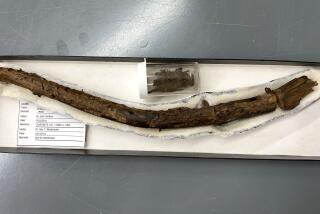Endangered Plant Saved by Flames
- Share via
One of the world’s most endangered plants, the Peter’s Mountain mallow, was down to just four known individuals in 1991 before it was rescued by setting fire to its habitat in southwestern Virginia’s Giles County. Now, according to a report by the Nature Conservancy, which owns the land, there are hundreds.
The mallow, Iliamna corel, is a perennial that grows four or five feet tall and produces a dozen or more pink flowers. When the species was discovered in 1927 there were only about 50 plants. Over the years the number dwindled, even though the conservancy acquired the site and maintained it as a secluded preserve.
By 1986, scientists funded by the U. S. Fish and Wildlife Service feared for the mallow’s survival and tried to figure out why it was declining. Growth rings on nearby trees showed that long ago the area had been subject to frequent wildfires. In recent decades, however, fire prevention efforts had worked well. Perhaps too well: Like a few other species, the researchers suspected, the mallow’s tough-coated seeds might not sprout until cracked open by the heat of fire.
Two years later they found some dormant seeds buried in the soil and heated them in the lab. The seeds opened, letting water in.
In May, 1992, the conservancy, along with state and federal foresters, lighted test grass fires over areas where newly shed mallow seeds lay on the ground. A few seeds sprouted and grew. A second burn this past spring resulted in about 500 seeds sprouting.
“This shows us that simply setting aside land to protect rare or endangered species does not necessarily guarantee their protection,” Nature Conservancy President John Sawhill said. “The remarkable comeback of Peter’s Mountain mallow through the use of prescribed burning demonstrates the important role that this type of land management tool plays.”
More to Read
Sign up for Essential California
The most important California stories and recommendations in your inbox every morning.
You may occasionally receive promotional content from the Los Angeles Times.













